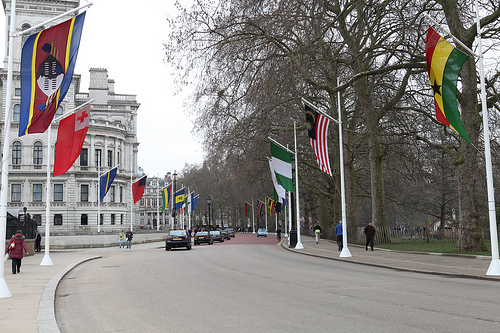21st March 2014
Commonwealth
When I wrote about the problems in Ukraine just over a month ago, I don’t think anyone expected what has since happened. I’ve written separately (in Russian) on the referendum in Crimea – I fear there will be more fountains of tears in Crimea.
Recent events have happened despite both Ukraine and Russia being members of the Commonwealth of Independent States.
The English translation of this entity is Commonwealth. The original Russian word is содружество. This implies something a bit different – perhaps fraternity, or friendship, a more formal version of дружба.
The English word “commonwealth” was originally “the common wealth” or “the common weal”, as in a common “welfare” or common “well-being”. Or another way of saying there is a common state between peoples.
The “Commonwealth of England” was the official name for the government for part of the time when Oliver Cromwell ruled in the 17th century. This was after the Civil Wars which saw one king, Charles I, deposed and executed, and before his son Charles II was “restored” to the throne.
Commonwealth has also been used in English to describe the Polish-Lithuanian state or Rzeczpospolita. So a synonym would be “republic”, a common interest, or state. Some nations describe themselves as a commonwealth, such as the Commonwealth of the Bahamas, and some states of the USA describe themselves as “commonwealths”, such as Massachusetts.
The term Commonwealth was proposed by a British politician, Lord Rosebery, to describe those countries within the British Empire that had their own governments. Members first agreed a statute in 1931, and as more territories secured their independence, the membership of the Commonwealth increased.
Today the organisation for the Commonwealth has 53 member states. Not all members were previously part of the British Empire, nor are all former colonies or territories ruled by Britain members of the organisation today.
10 March was Commonwealth Day. We celebrated it in Minsk – but not by organising any reception or great diplomatic festivity. Rather, we had a dinner a few days later with colleagues who represent other Commonwealth countries.
We agreed that the Commonwealth was about our shared heritage, such as the English language. There is the continued link with our royal family – HM Queen Elizabeth is still the head of the Commonwealth. Another important aspect has been the promotion of democracy, although the democratic systems in member states vary quite markedly, and not all are close copies of the Westminster model.
At our dinner, we spent as much time talking about other common interests, such as cricket, and the various issues we face in our professional lives in Minsk. None of us have large communities of our fellow nationals.
I think our dinner reflects the Commonwealth as it is – a voluntary network of people who come together in friendship. In that respect, содружество is exactly the right Russian translation for our gathering.

The word “Commonwealth” needs some explanation, not a favourite word for me because it needs explanation and to most is not understood and so is meaningless, so I agree with Bruce in his explanation, “A voluntary network of people who come together in friendship”. Thanks Bruce.
“If I cry my tears are yours to open closed and frozen doors”
(Dedication for Mark Feld, Golders Green Crematory , London )
Dear Bruce ,
all these horrible pictures of yesterday’s BBC – News ’bout the Russian/ Ukrainian crisis just went out of my head. So I ‘ve rememberd that I ḿ often visiting “Golders Green Crematory ” in London. In re. of yr. lines above I immediately thought of this dedication (written on a dark wall) for a well – known
UK-singer/songwriter. I do believe , that esp. the line ’bout reopening closed & frozen doors is fitting well in re. og the current relationship between Russia and the Ukraine.
Have a peaceful weekend, oin friedliches Wochenendle, Ingo-Steven, Stuttgart
Dear Bruce ,
unfortunately you ‘re completely right . I do also think that (much) more “fountains” of tears in Crimea will be cried. Plus : I only can hope , that no further “blood” will floating. Nevertheless : Most notable to me are yr. several clarifications ’bout the different meanings of the word ” COMMONWEALTH” during the last centuries. Most remarkable to me is ’cause of the current Crimea crisis the original Russian meaning, “Friendship”. So well , what kind of friendship is it at all if military Russian forces just feel the right to occupy foreign, Ukrainian – Territories like the Crimean-Peninsula ? Hope, that Moscow will think about it AND the perhaps hard consequences.
Best wishes, liebe Grüßle, Ingo-Steven, Stuttgart